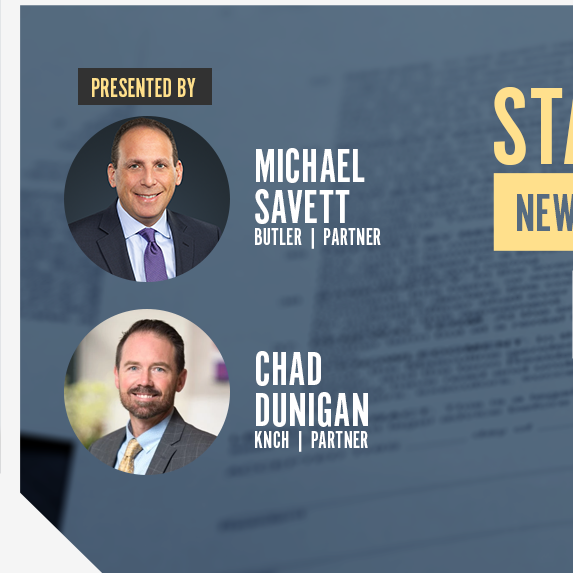
A Theoretical Safety On The Trigger Of The Duty To Defend
February 1, 2018
This article is originally a publication of National Insurance Law Forum, February 2018. Legal opinions may vary when based on subtle factual differences. All rights reserved.
The Eleventh Circuit of the United States Court of Appeals recently decided Selective Insurance Company of the Southeast v. William P. White Racing Stables, Inc., et al., 2017 WL 6368843 (December 13, 2017), a case addressing limits upon what facts and legal theories may give rise to a duty to defend. In an unpublished opinion,[1] the court held the district court erred in finding a duty to defend based upon a theory of liability which was not pled, even though it agreed the facts alleged in the complaint could support a claim apparently within the scope of coverage provided by the liability policy.
Selective Insurance Company of the Southeast (Selective) filed an action for declaratory judgment in the Southern District of Florida of the United States District Court, invoking the court’s diversity jurisdiction. Selective asserted it had no duty to defend its insured, William P. White Racing Stables (White Racing), in a lawsuit brought by a former employee, James Rivera. The district court determined Selective owed a duty to defend and entered a partial declaratory judgment in favor of White Racing.
Rivera had been paralyzed from the neck down as the result of an accident at the Calder Race Track in Miami Gardens, Florida. Rivera was injured when the horse he was riding at full gallop suddenly collapsed. Rivera asserted the horse was unfit to be exercised or raced due to an injury which had been concealed by steroids and other medications.
Rivera sued White Racing, the track, and several veterinarians, alleging the negligence of nearly all defendants caused his injuries. But Rivera did not assert a negligence claim against White Racing. Instead, the two counts against White Racing were based upon its alleged failure to preserve the remains of the horse (preventing any testing for performance-enhancing drugs): Count VIII asserted a claim under the Florida Worker’s Compensation Statute for failure to cooperate in investigating and prosecuting Rivera’s claims against a third-party tortfeasor; and Count IX asserted a claim for spoliation of evidence.
White Racing had been issued both a worker’s compensation policy and an employer’s liability policy by Selective. Selective paid benefits to Rivera under the worker’s compensation policy, but maintained there was no duty to defend against the claims of Counts VIII and IX because they did not fall within the terms of the liability policy’s coverage for damages arising from “bodily injury by accident.” Arguing Rivera’s claims against White Racing were for economic damages that arose from duties to preserve evidence and not bodily injury, Selective sought the district court’s declaration that it had no duty to defend.
White Racing conceded Counts VIII and IX did not fall within the coverage afforded by the liability policy but argued that Selective was obligated to defend because the facts alleged in the complaint could support a negligence claim against White Racing for Rivera’s injuries. Ruling on competing motions for summary judgment, the district court entered partial declaratory judgment in favor White Racing. Selective appealed.
Under Florida law (and the law of a majority of states), an insurer’s duty to defend depends solely upon the facts and legal theories alleged in the pleadings and claims against the insured. For the duty to be triggered, “[t]he allegations within the complaint must state a cause of action that seeks recovery for the type of damages covered by the insurance policy in question.”[2] Broadly interpreting the duty to defend, the Eleventh Circuit reasoned the “insurer must defend even if facts alleged are actually untrue or legal theories unsound.”[3]
Turning to the Complaint, the Eleventh Circuit noted the Florida Supreme Court previously found claims against an insured for breaching a duty to preserve evidence fell outside the coverage provided by a liability policy applying to “bodily injury by accident.”[4] Accordingly, the Eleventh Circuit held Counts VIII and IX did not give rise to a duty to defend.
The Eleventh Circuit next considered White Racing’s argument that the duty to defend is determined by the totality of the factual allegations in the complaint, irrespective of the specific counts pled, with all doubts resolved in favor of the insured. The district court had agreed with this argument and concluded the facts alleged in the complaint could support a finding of negligence against White Racing for Rivera’s injuries. Selective objected to the argument on two grounds: first, the duty to defend cannot be based on a theoretical claim that was not actually pled; and second, no negligence claim against White Racing could be pursued because of a worker’s compensation exclusion in the liability policy.
With no Florida decision directly on-point, the Eleventh Circuit found the instant facts fell between two broad principles:
- Insureds generally may not trigger the duty to defend by invoking theories of liability that were not alleged in the complaint.[5]
- Allegations that support alternative theories of liability, some covered by the policy and some not, still trigger the duty to defend.[6]
Under Florida law, an insurer “is not required to defend if it would not be bound to indemnify the insured even though the plaintiff should prevail in his action.”[7] The Eleventh Circuit found the complaint clearly sought recovery for damages due to Rivera being unable to prove a cause of action, as a consequence of White Racing’s failure to preserve evidence. The Florida Supreme Court determined that such damages are not covered by a liability policy.[8] Because the complaint did not seek damages arising from “bodily injury by accident,” the Eleventh Circuit found Selective would not be bound to indemnify White Racing, even if Rivera prevailed in the lawsuit. Accordingly, the court held Selective had no duty to defend White Racing against Rivera’s claims.[9]
Though it agreed the facts alleged in the complaint could support a claim of negligence against White Racing, the Eleventh Circuit did not conclude the Florida Supreme Court would find a duty to defend based on the “mere theoretical possibility” that Rivera could later assert such a claim. The Eleventh Circuit noted no such claim was asserted against White Racing, though it had been asserted against other parties, suggesting Rivera’s available remedies were limited by complications arising from his receipt of worker’s compensation benefits. Distinguishing Baron Oil Co. (a decision by an intermediate Florida appellate court, see FN 6) and similar authority that permit evaluation of alternative theories of liability suggested by, but not expressly alleged in, the complaint, the Eleventh Circuit found the possible negligence claim constructed by White Racing to be entirely distinct from, and not an alternative to, the spoliation claims alleged in the complaint. As a consequence, the court concluded a claim of negligence was only a “hypothetical possibility,” that did not trigger Selective’s duty to defend. However, the court noted the duty could arise later if Rivera subsequently raised a bodily-injury negligence claim.
The Eleventh Circuit’s decision is unpublished. According to Rule 36-2 of the U.S. Ct. of App. 11th Cir., “[u]npublished opinions are not considered binding precedent, but they may be cited as persuasive authority.” In support of its persuasive authority is the decision of the Florida intermediate appellate court in Chicago Title Ins. Co., holding that insureds generally may not trigger the duty to defend by invoking theories of liability that were not alleged in the complaint.[10] The court’s suggestion that White Racing’s argument was doomed, or at least too unrelated to the theory of recovery actually pled, to be considered as an alternative theory under Baron Oil Co., is dicta and therefore may have less persuasive authority. Though not precedent, the Eleventh Circuit’s opinion in Southeast v. William P. White Racing Stables, Inc., et al. is an interesting consideration of the two analyses of when the duty to defend is triggered, and suggestive of how the competing arguments can be framed.
[1] U.S. Ct. of App. 11th Cir. Rule 31—2. Citing Judicial Dispositions
(a) Citation Permitted. A court may not prohibit or restrict the citation of federal judicial opinions, orders, judgments, or other written dispositions that have been:
(i) designated as “unpublished,” “not for publication,” “non-precedential,” “not precedent,” or the like; and
(ii) issued on or after January 1, 2007.
. . .
U.S. Ct. of App. 11th Cir. Rule 36—2. Unpublished Opinions
An opinion shall be unpublished unless a majority of the panel decides to publish it. Unpublished opinions are not considered binding precedent, but they may be cited as persuasive authority. If the text of an unpublished opinion is not available on the internet, a copy of the unpublished opinion must be attached to or incorporated within the brief, petition, motion or response in which such citation is made. But see I.O.P. 7, Citation to Unpublished Opinions by the Court, following this rule.
[2] State Farm Fire & Cas. Co. v. Tippett, 864 So.2d 31, 35–36 (Fla. Dist. Ct. App. 2003).
[3] Lawyers Title Ins. Corp. v. JDC (Am.) Corp., 52 F.3d 1575, 1580 (11th Cir. 1995)
[4] Humana Worker’s Comp. Servs. v. Home Emergency Servs., Inc., 842 So.2d 778, 781 (Fla. 2003).
[5] Citing Chicago Title Ins. Co. v. CV Reit, Inc., 588 So.2d 1075, 1076 (Fla. Dist. Ct. App. 1991) (“[W]hether or not a duty to defend exists arises from the allegations of the complaint itself, not on some conclusions drawn by the insured based upon a theory of liability which has not been pled.” (citations omitted))
[6] Citing Baron Oil Co. v. Nationwide Mut. Fire Ins. Co., 470 So.2d 810, 813–14 (Fla. Dist. Ct. App. 1985) (“If the complaint alleges facts showing two or more grounds for liability, one being within the insurance coverage and the other not, the insurer is obligated to defend the entire suit.”)
[7] Capoferri v. Allstate Ins. Co., 322 So.2d 625, 627 (Fla. Dist. Ct. App. 1975).
[8] Humana Worker’s Comp. Servs.
[9] Because it concluded there is no duty to defend based on the allegations in the complaint, the court did not consider Selective’s arguments that the worker’s compensation exclusion negated any duty that it would have had to defend a possible negligence claim
[10] Chicago Title Ins. Co. v. CV Reit, Inc.,FN 5 supra



